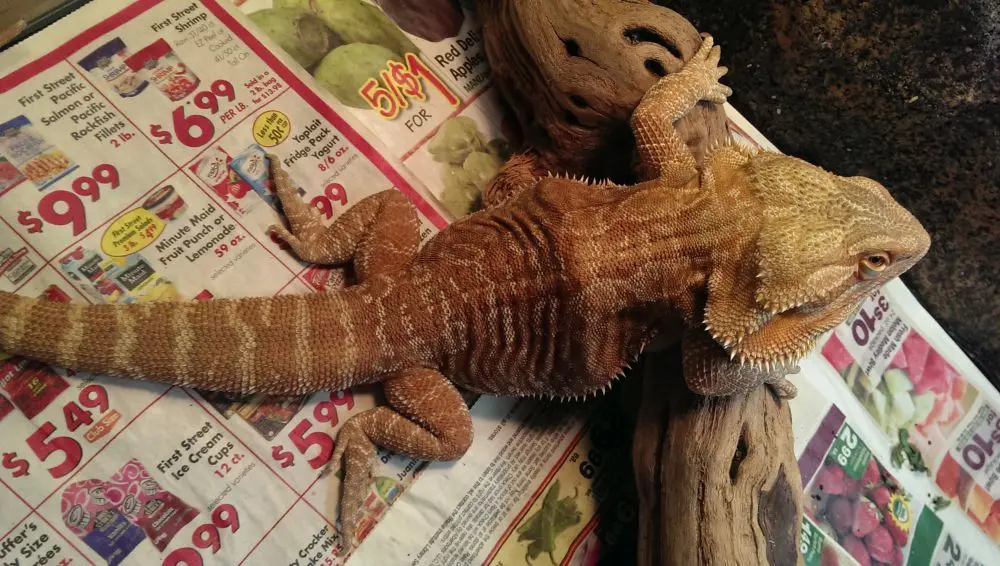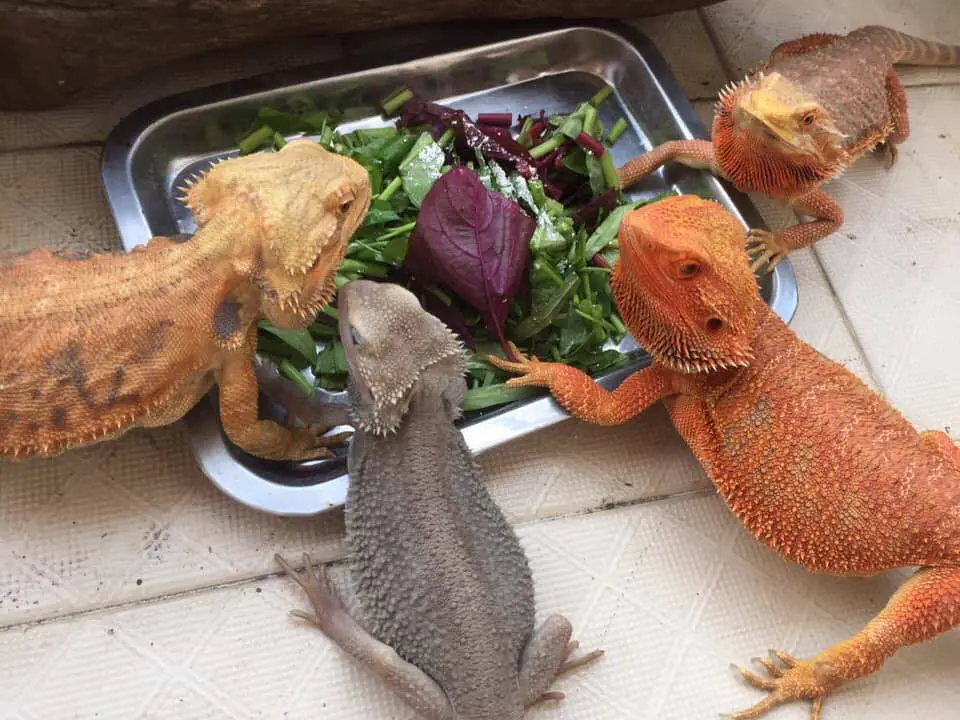A bearded dragon refusing food or eating a small amount compared to their normal appetite can be exceptionally worrying for the reptile owner. There are many reasons your beardie may be refusing food, which we are going to outline below, helping you identify the problem and how to encourage them to eat.
Your Bearded Dragons Dietary Needs

It’s important to know what foods your bearded dragon needs. Your reptile may not be eating due to the selection you are providing. As a new reptile owner, it’s important you take careful note of your dragon’s dietary needs to ensure a happy and healthy pet.
As a young bearded dragon your reptile is going to require 20% of their diet comprising of greens and 80% comprising of insects. Once they mature, their dietary needs change to 20% insect and 80% greens.
The insects you give to your dragon can be purchased from a reputable reptile store and can be anything from crickets to super worms and mealworms to roaches.
Their greens selection should include collard greens, mustard greens, dandelion greens, chicory greens, turnip greens and on occasion, you can introduce some coriander.
Ensure you never give your beardie spinach, rhubarb, avocado, beets or any glowing insects, such as fireflies.
Why Your Bearded Dragon Is Not Eating
1. Brumation
Brumation is a natural process that some bearded dragons go through. Note, not all beardies go through this process, which is a hibernation process.
Hibernation is a lengthy state of sleep and your beardie may never go through this state, or they may go through it for a few weeks to months. During this time your beardie will limit their food intake. It’s essential to keep your dragon hydrated.
2. Constipation / Impaction
Impaction is similar to constipation in humans. It’s not uncommon for reptiles to stop eating for a while until this passes.
There are numerous reasons for your dragon experiencing impaction from eating an excess of a certain food, such as eating too many insects to consuming substrate in their tank.
Related –Best substrate for bearded dragon
3. Illness
If you check off all the potential reasons your bearded dragon isn’t eating from this article and you still cannot find an answer, then it is possible that your dragon is unwell. A trip to the vet may be in order. Dropping samples may be needed to identify the problem.
4. Injury

Injury is another very common reason that your beardie may not be eating. Reptiles can break bones the same as other pets. Broken bones are not uncommon when it comes to fighting or incorrect handling, especially with younger dragons, which have weaker bones.
A sign that your bearded dragon may have a broken bone is swelling in a localized are and lack of appetite. Take your reptile to the vet as soon as possible.
5. Infection
Mouth rot is a very common infection that occurs in bearded dragons. This mouth injection can be very painful, making it too painful for your bearded dragon to eat.
With mouth rot comes swelling in the head and white and yellow in the oral cavity. You may also notice an increase in saliva production, bleeding, or loose teeth. The good news is that mouth rot is treatable with excellent outcomes.
6. Itching
When bearded dragon grows, they outgrow their skin, which results in what is called “shedding.” During this process, your dragon is going to be itchy and this can lead to discomfort.
Once shedding is completed, your dragon will resume their normal dietary habits.
7. Lighting
What you may not know is that lighting can have a significant impact on your reptile. Their cages go from dark to brilliant light and while you try to create a habitat that is as natural as possible, lighting can be tricky and can be confusing for your reptile.
When it’s dark or the temperature is on the cooler side, your dragon is going to tend to sleep. They will only eat once they are warm enough, which is why it’s advisable to keep an eye on your tank temperatures and feed once the light has been on for some time, enabling your beardie to warm up.
Note that a lack of UVB light can also suppress appetite.
8. Maturing
If you have noticed that your bearded dragon is eating but nowhere near as much as they were before, it could be that they are simply growing up.
Younger dragons tend to eat considerably more than adults, enabling them to grow. Baby and juvenile bearded dragons grow at a rapid rate in their first few months and need fuel to help them do this.
Once their growth starts to even off, they will slow down on their eating and their dietary requirements will change.
9. Parasites
It is so important that you only purchase insects from reputable reptile stores and suppliers.
Insects that have not been sourced correctly can carry parasites that are transferred to your bearded dragon with one of the telltale signs being lack of appetite, or in some cases, overeating.
Your dragon will seem lethargic and generally unwell. Take them to the vet as soon as possible.
10. Vitamin Deficiency
Not all bearded dragons love their greens to start off with and without their greens intake, they can experience a number of health problems. An unbalanced diet will result in a vitamin deficiency.
11. Unhappy Dragon
Bearded dragons are known to be expressive and with negative emotions comes a lack of appetite.
There are numerous reasons your beardie may be unhappy, it could be the smallest change in diet, temperature, or lighting.
If you have just moved them to a new tank or moved their tank to another room, it’s not uncommon for your beardie to take some time to settle.
In addition to this, if you have more than one bearded dragon in the tank, there could be some dominant and bullying behavior which could result in one of the beardies being stressed and not eating.
Related –Best bearded dragon tank
What to Do

There are a number of ways you can encourage your bearded dragon to eat, these include:
- Tempt greens with flavors by using their favorite foods and spreading it over the greens.
- Cut greens into smaller pieces to prevent the risk of picking and choosing.
- Hang leafy greens to allow the bearded dragon to pick them on their own, cropping as desired.
- Try living plants.
- Consider hand feeding to encourage your bearded dragon to eat.
- Provide a varied diet
- Use an appetite stimulant
- Make feeding a fun experience
- Don’t give up
- Only force feed in very serious situations – syringe feed includes pumpkin, pea puree, squash.